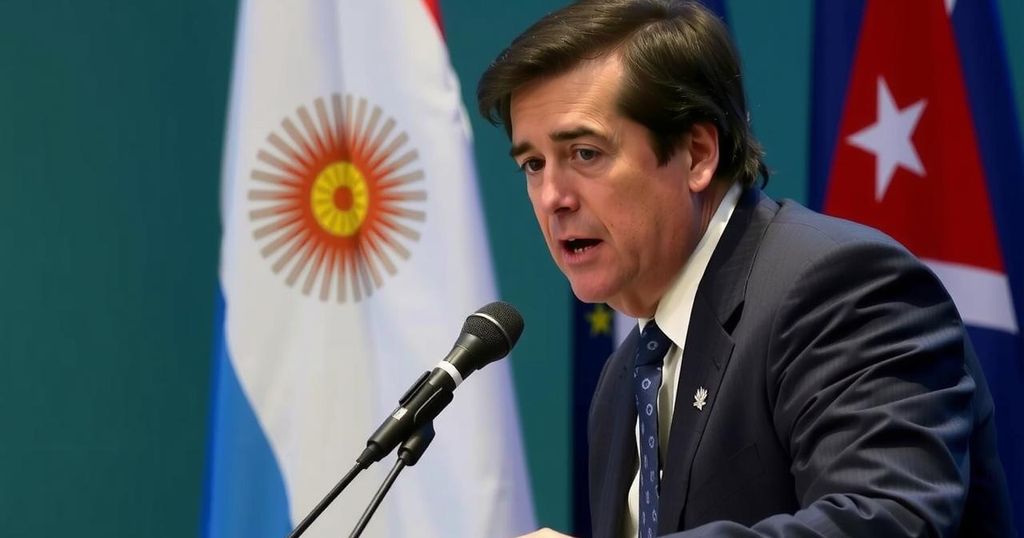Argentina’s Milei Dismisses Foreign Minister Following UN Vote on Cuba Embargo

President Javier Milei of Argentina dismissed Foreign Minister Diana Mondino after the country voted at the UN in favor of lifting the US embargo on Cuba. This decision marks Argentina’s first deviation from US and Israeli positions since Milei took office, as only these two countries voted against the resolution, while 186 nations supported it. The new foreign minister, Gerardo Werthein, was formerly Argentina’s ambassador to the US. The diplomatic implications of this shift raise questions about future relations, particularly regarding Argentina’s claims over the Falkland Islands.
On Wednesday, October 18, 2023, President Javier Milei of Argentina made the controversial decision to dismiss Foreign Minister Diana Mondino following Argentina’s supportive vote at the United Nations to lift the longstanding United States embargo on Cuba. This significant departure from traditional Argentine diplomatic alignment marks the first occasion during Milei’s presidency wherein Argentina has diverged from the positions of the United States and Israel, the only two nations to oppose the resolution that ultimately garnered support from 186 other member states. Shortly after Mondino’s termination was communicated, President Milei retweeted a statement from a lawmaker expressing pride in a government that does not support or condone authoritarian regimes, stating “Viva CubaLibre.” The newly appointed foreign minister, Gerardo Werthein, previously served as Argentina’s ambassador to the United States. The decision to back the resolution raised concerns over potential diplomatic repercussions for Argentina, particularly concerning its historical stance against the US embargo on Cuba and its ongoing claims related to the sovereignty of the Falkland Islands, a territory it disputes with the United Kingdom. Historically, Argentina had consistently voted against the embargo, underscoring the implications of its newfound position.
The US embargo on Cuba, enacted in 1962, has been a longstanding point of contention in international relations, with various countries expressing divergent views on its legitimacy and impact. Argentina, traditionally aligned with anti-embargo sentiments, has previously voted against the sanctions. President Javier Milei’s administration, which began in late 2023, has taken a distinctly different diplomatic path, suggesting a re-evaluation of Argentina’s relationship with both the United States and other nations in the Latin American region. The recent vote at the UN exemplifies a shift in tone, as it aligns Argentina more closely with countries that oppose the embargo, which could have ramifications for its future diplomatic engagements, particularly regarding the Falkland Islands dispute.
In summary, President Milei’s decision to dismiss Foreign Minister Diana Mondino following Argentina’s vote at the UN to lift the US embargo on Cuba signals a significant shift in the country’s foreign policy. This move not only marks a departure from previous diplomatic practices but also positions Argentina at odds with longtime allies, potentially complicating future relationships and negotiations, particularly concerning the Falkland Islands. The appointment of Gerardo Werthein as the new foreign minister may indicate a continued re-assessment of Argentina’s foreign relations under Milei’s leadership.
Original Source: www.france24.com








